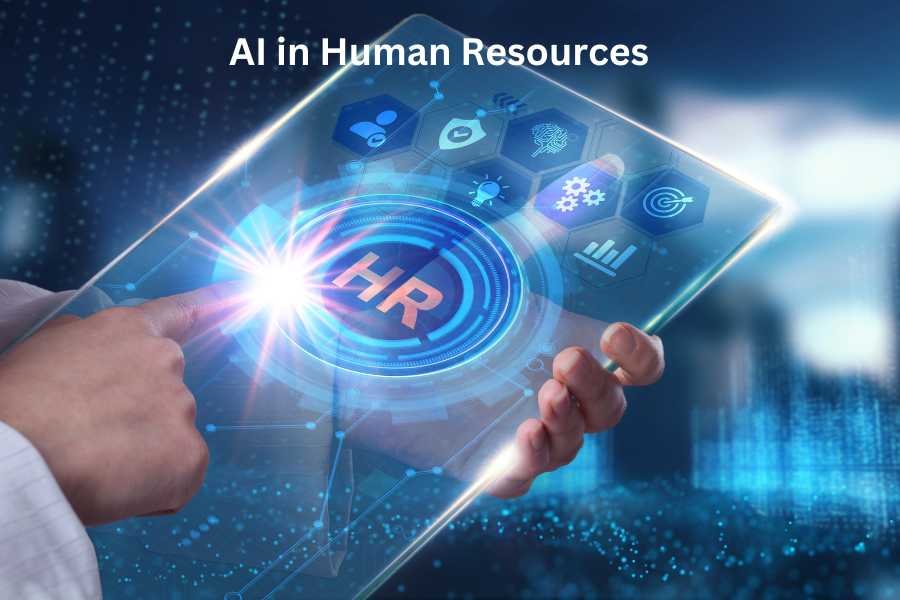Welcome to the future of AI in business! Artificial intelligence (AI) is transforming the way companies operate, bringing unprecedented efficiencies and growth. In this blog post, we’ll explore the various applications of AI in business, from sales and marketing to human resources and cybersecurity. Be prepared to discover the exciting potential of AI and how it can revolutionize your business operations.
Short Summary
Unlock the power of AI in business with 9 applications, including sales & customer relationship management, marketing strategies and customer support.
Streamline communication and optimize operations while analyzing customer feedback to improve experience.
Evaluate & integrate AI solutions into existing processes for automation & better decision making.
Discovering AI in everyday life and business is now a reality for our youth as well as adults. Lets look at some important applications.
AI in Sales and Customer Relationship Management

AI in business is revolutionizing the way businesses handle customer relationships. By employing machine learning algorithms and natural language processing, AI can understand customer requests and streamline job processes, leading to a better customer experience. In fact, adopting artificial intelligence can lead to a 50% increase in leads, a 60-70% reduction in call time, and cost reductions of 40-60%.
Predictive analytics and targeted marketing are just some examples of how AI can enhance customer relationships. By analyzing customer data, businesses can gain actionable insights and develop targeted marketing strategies, resulting in increased sales and improved customer satisfaction. Furthermore, AI can automate sales and customer relationship management tasks, freeing up human workers to focus on more complex tasks.
Companies that embrace artificial intelligence in business operations can benefit from cost savings, increased productivity, and improved customer relationships. By leveraging AI, businesses can stay ahead of the competition and ensure long-term success in an ever-evolving digital landscape.
AI-Driven Marketing Strategies

One of the most significant advantages of AI in business is the ability to create highly targeted marketing strategies. By using advanced technologies such as facial recognition and geospatial software, AI-driven marketing strategies can deliver personalized products to customers, helping businesses develop more effective strategies.
AI can also analyze large amounts of customer data to forecast customer requirements and preferences, optimizing marketing efforts. However, it is crucial that businesses exercise responsibility and ethicality while leveraging AI and maintain compliance with data privacy regulations. By doing so, companies can reap the benefits of AI-driven marketing strategies, leading to an expansion of their customer base, higher customer satisfaction, and increased profits.
Enhancing Customer Support with AI

AI can greatly enhance customer support by streamlining communication, analyzing customer feedback, and providing prompt replies to customer messages.
In the following subsections, we will delve deeper into how AI can improve customer support by optimizing communication and analyzing customer feedback.
Streamlining Communication
AI-powered process automation tools can connect workflows and flag important customer feedback, preventing missed opportunities and boosting productivity. By automating tasks and providing relevant information at the right time, AI can significantly increase efficiency in customer support operations.
Moreover, AI can analyze massive amounts of customer interactions, helping businesses identify trends and patterns to further improve their services. By streamlining communication and providing valuable insights, AI can not only enhance customer experience, but also give businesses a competitive advantage in the marketplace.
Analyzing Customer Feedback
AI can play a crucial role in analyzing customer feedback, allowing businesses to identify trends and patterns that can be used to improve customer experience. By utilizing text analytics, AI can employ natural language processing and machine learning algorithms to extract meaningful insights from customer feedback.
Furthermore, AI can perform a qualitative analysis of customers’ feelings and desires by examining the language used in customer feedback and recognizing the implicit emotions and desires. This can help businesses gain a deeper understanding of their customers and offer improved customer experiences, ultimately resulting in increased customer satisfaction and loyalty.
Optimizing Business Operations with AI

Artificial intelligence can optimize various aspects of business operations, from inventory management to supply chain operations. By improving inventory tracking, updating online stores, and forecasting needs, AI can minimize overstocking and ensure that in-demand products are always available.
One of the most significant areas where AI can optimize business operations is in supply chain management. Gartner has predicted that by 2024, 50% of supply chain organizations will have invested in applications that feature AI and advanced analytics. This is expected to significantly improve the performance of their operations. AI can also play a vital role in IT operations, detecting anomalies that may indicate hacking activities or ransomware attacks and providing self-healing capabilities for infrastructure issues.
Moreover, AI can be utilized to monitor worker safety, inventory, and hazardous conditions, ensuring a secure and efficient work environment. By integrating AI into business operations, companies can optimize various processes, leading to increased efficiency and better decision-making.
AI in Human Resources and Talent Management

AI is making significant strides in human resources and talent management, with applications ranging from virtual recruiting to hybrid and remote work solutions, as well as diversity and inclusion initiatives.
In the following subsections, we will explore how AI can be used to create remote and hybrid work solutions and provide personalized employee training and development.
Remote and Hybrid Work Solutions
The rise of remote and hybrid work solutions has been a game-changer for businesses, offering increased productivity, cost savings, and improved employee satisfaction. AI can be used to create these solutions by automating scheduling, facilitating video conferencing, and supporting virtual collaboration.
Moreover, AI-powered chatbots can be utilized for customer support and responding to employee queries, further enhancing the efficiency of remote and hybrid work environments. By employing AI in this capacity, businesses can ensure a seamless transition to remote and hybrid work solutions, enabling employees to stay connected and productive regardless of their location.
Employee Training and Development
AI can revolutionize employee training and development by providing personalized plans tailored to each employee’s needs and skillset. By automating mundane tasks and recognizing gaps in knowledge, AI can execute targeted learning and development strategies, reducing the risk of human error and freeing up human workers to focus on more intricate tasks.
Businesses that invest in AI-infused training software can upskill their employees and ensure they are equipped with the necessary skills and knowledge to excel in their roles. By leveraging AI for employee training and development, businesses can stay ahead of the curve and maintain a competitive edge in the market.
AI in Accounting and Financial Management

AI has the potential to automate various activities in accounting and financial management, improving accuracy and uncovering hidden trends. By automating tasks such as data entry and fraud detection, AI can significantly reduce the risk of human errors and save valuable time and resources.
Moreover, AI can enhance data security in accounting and financial management, ensuring that sensitive information is protected and compliant with relevant regulations. By integrating AI into these processes, businesses can streamline operations, minimize errors, and focus on more strategic decision-making.
AI in Cybersecurity and Data Protection

Artificial intelligence can play a vital role in cybersecurity and data protection by detecting threats and vulnerabilities, ensuring data privacy compliance, and protecting sensitive information.
In the following subsections, we will explore how AI can be used to detect threats and vulnerabilities and ensure data privacy compliance.
Detecting Threats and Vulnerabilities

AI can be used to monitor data from endpoint devices and alert companies to dangerous conditions or business opportunities. For example, AI can analyze vast troves of data to identify patterns and irregularities, pinpointing suspicious activities and recognizing malicious actors.
Moreover, AI can simplify security tasks and reduce the effects of cyberattacks by providing real-time detection and response to cyber threats. By leveraging AI for detecting threats and vulnerabilities, businesses can ensure a secure and efficient work environment, protecting valuable assets and sensitive information.
Ensuring Data Privacy Compliance
AI can be utilized to ensure data privacy compliance and protect sensitive information. By analysing large volumes of data and identifying potential risks, AI can reduce the likelihood of privacy breaches and cybersecurity incidents.
It is essential for organizations to implement data security measures, conduct regular risk assessments, and provide training to employees on data privacy regulations. By incorporating AI into these processes, businesses can ensure they are compliant with relevant laws and regulations, mitigating potential risks and avoiding costly penalties.
Implementing AI Systems in Your Business
To fully take advantage of AI’s potential in business, digital entrepreneurs as well as large companies must develop business strategies that evaluate AI solutions and integrate them into existing business processes.
In the following subsections, we will discuss how businesses can evaluate AI solutions and integrate them into their existing business strategies to maximize value.
Evaluating AI Solutions
Companies should assess AI tools to determine if they are up to the task and take incremental steps with currently available technology. Factors such as business value, availability of training data, cultural readiness for change, performance, explainability, and integration with existing systems should be taken into consideration when evaluating AI solutions.
Initiating pilot projects for cognitive applications is crucial, as it helps to identify the gap between the current and desired AI capabilities. Establishing a cognitive center of excellence can oversee pilot projects and cultivate the required technology abilities and competencies within the organization.
Integrating AI into Existing Processes
Companies should plan for transformational change in the not-too-distant future and redesign workflows between AI and humans, streamlining job processes. By incorporating AI into existing processes, businesses can automate mundane tasks, render data comprehensible for decision-makers, uncover insights that humans may overlook, facilitate market research, and revolutionize decision-making.
By integrating AI into existing processes, businesses can reap the benefits of increased efficiency, better decision-making, and a more streamlined workflow. As AI continues to advance, companies that embrace AI integration will be well-positioned to thrive in an increasingly competitive landscape.
It’s also very important to establish an AI ethics policy for your business. Your policy should be designed to ensure that AI best practices are focused on transparency and trust.
Summary
In conclusion, today every business owner or manager must now consider how to use AI solutions in their business. Artificial intelligence holds immense potential for businesses across various sectors, from sales and marketing to human resources and cybersecurity. By evaluating and integrating AI solutions into existing processes, businesses can unlock new opportunities, streamline operations, and stay ahead of the competition. Embrace the power of AI, and revolutionize your business today.
Frequently Asked Questions
How is AI used in business?
AI is an invaluable asset to businesses as it optimizes efficiency, automates tedious tasks, provides personalized services, and increases customer satisfaction. AI is used to manage inventory, automate mundane processes, analyze data, and engage with customers on a personal level.
With the right implementation, AI can be a tremendous competitive advantage for any business.
What are examples of AI in business?
AI technology is revolutionizing the way businesses operate, from automated customer service to smart personal assistants. AI has become an integral part of business operations and plays a vital role in simplifying processes and increasing efficiency. Examples include spam filters, voice to text features, automated responders, and process automation, just to name a few.
These AI-based tools have become an indispensable part of business success in the modern era.
What is artificial intelligence in business?
Artificial intelligence in business involves the use of automated computer systems to augment and complement the capabilities of human labor. This cutting-edge technology is being used to increase productivity, automate tedious processes, and optimize customer experiences in order to drive business growth and transformation.
How to implement ai in business?
Implementing AI in business requires a systematic approach. From understanding the differences between AI and ML, to defining business needs, prioritizing value drivers, evaluating internal capabilities, consulting a domain specialist, preparing data and implementing the tools, these seven steps can help your business capitalize on the power of AI.
How does ai help businesses?
AI offers businesses the ability to automate mundane tasks, quickly generate insights from large datasets, streamline operations, and develop better customer experiences. By using AI technologies to manage complex processes, businesses can reduce costs, increase operational efficiency, and improve decision-making.
Attention Entrepreneurs
[CLICK HERE TO LEARN MORE] about this FREE All-in-One Digital Marketing Platform for your business.





